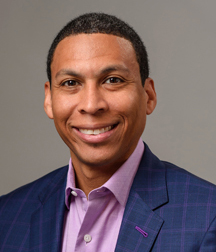
A graduate of Morehouse College, Cedric Dark, MD, MPH, FACEP earned his medical degree from New York University School of Medicine. He holds a master’s degree from the Mailman School of Public Health at Columbia University. He completed his residency training at George Washington University where he served as chief resident. Currently, Dr. Dark is an associate professor at the Henry J. N. Taub Department of Emergency Medicine at Baylor College of Medicine.
Dr. Dark is the 2017 recipient of the Texas Medical Association’s C. Frank Webber Award, a 2019 American College of Emergency Physicians Choosing Wisely Champion, the Emergency Medicine Residents’ Association 2021 Joseph F. Waeckerle Alumni of the Year Award, one of emergency medicine’s Top 45 Under 45, and on Elemental’s List of 50 Experts to Trust in a Pandemic. He is currently on the Board of Directors for Doctors for America and the medical editor-in-chief for ACEP Now, the official voice of emergency medicine.
.
View this author's posts »

3 Responses to “U.S. Doc Takes EM Job in New Zealand, Discusses Their Health Care System”
April 3, 2022
Trent StephensonTwo important differences are that the population in New Zealand has very different expectations with end of life and that getting sued is extremely difficult. This combination helps keep cost low. The altered 90yo in the US gets a head CT and full work up. In most parts of New Zealand the CT isn’t done because you’re not flying grandma out for a neurosurgeon regardless of the result.
April 3, 2022
Diane MolinariDoes New Zealand allow APPs to practice Emergency Medicine?
April 27, 2022
Mark BakerIt was great to read this. I was told I might have been the first residency training emergency physician in the country. I figured out how to do a 2 week elective in Christchurch New Zealand in 1984 when I was a third-year resident. I worked as an attending because they did not have any residencies.
I could certainly see and appreciate the differences in the healthcare systems. At that point they were using hospitalists for inpatient care, we were not. They divided acute hospital care into specialty hospitals and the prehospital providers new which place to go.
One other distinctive memory is the importance they placed on accountability from the patient. If someone came into the emergency department off-hours with a problem that had been existent for several days they would sometimes send the patient home and tell them to see their doctor in the morning. This might not be the best care but it promotes accountability.
I have fond memories!
Mark